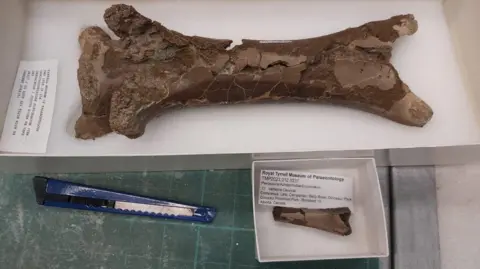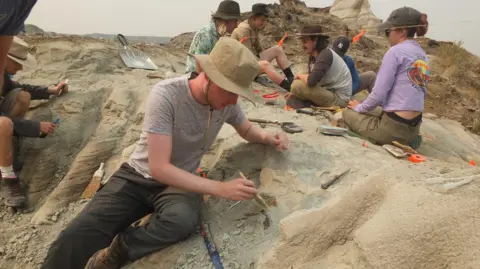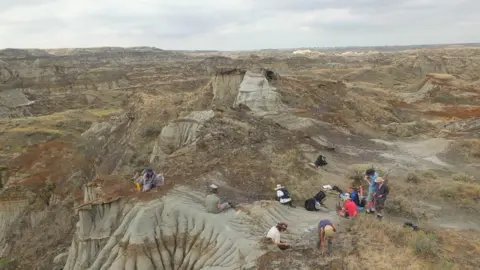Prehistoric bone bitten by croc-like creature found
 University of Reading
University of ReadingThe fossilised neck bone of a flying reptile that was bitten by a crocodile-like creature 76 million years ago has been discovered by researchers.
The bone, which belonged to a young pterosaur, was unearthed in Canada in July 2023 by researchers from the University of Reading.
A subsequent study released last month found that the bone features a circular 4mm-wide puncture mark from a crocodilian tooth.
Researchers said the "rare evidence provides insight into predator-prey dynamics in the region" during the Cretaceous Period.
The bone was discovered in Dinosaur Provincial Park, Alberta, during a course led by Dr Brian Pickles from the University of Reading.
 University of Reading
University of ReadingA scientific paper studying the bone was written by researchers from Canada's Royal Tyrrell Museum of Palaeontology (RTMP) and the University of New England in Australia, alongside Dr Pickles.
Dr Caleb Brown, from the RTMP, said: "Pterosaur bones are very delicate, so finding fossils where another animal has clearly taken a bite is exceptionally uncommon."
"This specimen being a juvenile makes it even more rare," Dr Brown, lead author of the paper, said.
 University of Reading
University of ReadingThe punctured vertebra is believed to have belonged to a young Azhdarchid pterosaur, with an estimated wingspan of 6ft 7in (2m).
Adults of this species would have been as tall as a giraffe, with a wingspan in the region of 32ft 10in (10m).
Researchers used micro-CT scans and comparisons with other pterosaur bones to confirm the bite was real and not the result of damage during fossilisation or excavation.
Dr Pickles said: "Bite traces help to document species interactions from this period.
"We can't say if the pterosaur was alive or dead when it was bitten but the specimen shows that crocodilians occasionally preyed on, or scavenged, juvenile pterosaurs in prehistoric Alberta over 70 million years ago," he said.
The bone is the first evidence found in North America of ancient crocodilians feeding on the giant prehistoric flying reptiles, the study added.
You can follow BBC Berkshire on Facebook, X (Twitter), or Instagram.
